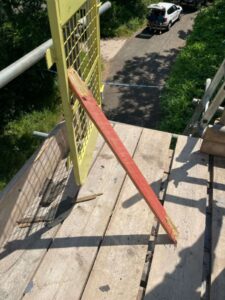Roofer given suspended sentence after man falls from scaffold
A self-employed roofer has received a suspended prison sentence after a man suffered serious injuries after falling from scaffold in Devon.
Daniel Hooper was given a 16-week custodial sentence, which will be suspended for a period of 12 months, following Iain Smith, 36, falling from a height of more than 25 feet while working for him, on 13 June 2023.

Father of three Mr Smith had been manually carrying old roof slates down a ladder attached to the scaffold platform at a domestic property in Honiton when he fell, suffering serious injury, including five broken vertebrae, as well as skull and rib fractures. Devon Air Ambulance took Mr Smith to Derriford Hospital where he was put into an induced coma for five days. He has since made a remarkable recovery but does still suffer from the effects of his injuries.
An investigation by the Health and Safety Executive (HSE) found that Daniel Hooper, 28, trading as Hooper Roofing, failed to ensure the health, safety and welfare of his employee as he did not undertake any planning or appropriately supervise the work at height or supply suitable equipment to do the task safely.
Falls from height remain a leading cause of workplace death and serious injury and HSE has published guidance about how these incidents can be avoided. It is vital that employers plan work at height on any size building or roof work project. Every employer should take suitable and sufficient measures to prevent any person falling a distance liable to cause personal injury. While ladders can be used for accessing a scaffold platform, HSE guidance is clear that they should only be used for low risk and short duration tasks. Work equipment or other measures must be used to prevent falls where working at height cannot be avoided.

The HSE investigation found that ladders were used to transfer heavy slate tiles to and from the scaffolding platform and this practice was not, so far as reasonably practicable, safe. There are alternative methods of transferring the slate tiles to and from a scaffolding platform that eliminate the need for ladders to be used for this task. These include the use of a pulley system or use of a mechanical conveyor.
Daniel Hooper, of Brook Road, Cullompton, Devon pleaded guilty to breaching Regulation 4(1) of the Work at Height Regulations 2005. He was sentenced to 16 weeks imprisonment, suspended for 12 months and ordered to complete 150 hours of unpaid work in the community at Exeter Magistrates Court on 6 February 2025. He was also ordered to pay costs of £10,875.
HSE inspector Thomas Preston said “Falls from height account for around half of all deaths in the construction industry and Mr Smith is very fortunate to still be alive today.
“The risks of working at height and the control measures are well established, including the need to supervise the work appropriately. Alternative methods of moving materials up and down from a scaffold platform are available and must be considered when planning roofing projects.”
This HSE prosecution was brought by HSE enforcement lawyer Iain Jordan and paralegal officer Helen Jacob.
Further information:
- The Health and Safety Executive (HSE) is Britain’s national regulator for workplace health and safety. We are dedicated to protecting people and places, and helping everyone lead safer and healthier lives.
- More information about the legislation referred to in this case is available.
- Further details on the latest HSE news releases is available.
- HSE guidance about working at height safely is available.
- HSE does not pass sentences, set guidelines or collect any fines imposed. Relevant sentencing guidelines must be followed unless the court is satisfied that it would be contrary to the interests of justice to do so. The sentencing guidelines for health and safety offences can be found here.